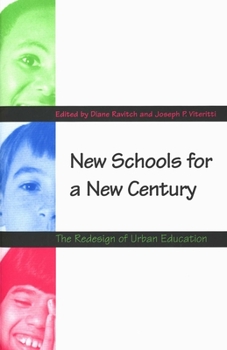New Schools for a New Century: The Redesign of Urban Education
Select Format
Select Condition 
Book Overview
As we cross the threshold of a new century, which approaches are likely to improve public education? In this book, distinguished scholars discuss recent innovations--charter schools, contracting arrangements, and choice--designed to liberate educators from burdensome bureaucratic controls and improve the level of opportunity for all children. Focusing on the problems in cities, where far too many children have been denied access to quality institutions, the authors examine the lessons to be learned from Catholic schools, site-based management, private entrepreneurs, and specific developments in three cities--New York, Milwaukee, and Chicago. The authors, though realistic about the political and institutional obstacles that stand in the way of meaningful change, foresee the demise of the "one size fits all" approach to schooling. They envision a system of schools that is dynamic, diverse, performance based, and accountable; one that is supportive of professionals, responsive to creativity, intolerant of failure, and committed to high educational standards for all children. Contributors: Louann Bierlein Anthony Bryk John Chubb Chester Finn Paul Hill Valerie Lee Paul Peterson Diane Ravitch Joseph P. Viteritti Priscilla Wohlstetter
Format:Paperback
Language:English
ISBN:0300078749
ISBN13:9780300078749
Release Date:March 1999
Publisher:Yale University Press
Length:336 Pages
Weight:1.01 lbs.
Dimensions:0.9" x 5.8" x 8.9"
Customer Reviews
1 rating
A good summary of structural educational reform
Published by Thriftbooks.com User , 25 years ago
One of the contributors to this book, Chester Finn, puts urban education in perspective with the fact that in 1995 nearly 25% of the furnaces in urban schools were still coal-fired. Ravitch and her contributors assess new political and educational policy initiatives from a positive, clear-headed point of view, toward the goal of understanding what works well, and how to make that happen elsewhere.The emphasis on school improvement, away from what Ravitch calls the "decrepit factory model of schooling," calls for a discussion of (i) the history of school improvement movements, (ii) the emergence of structural reforms in the early 1990s, including vouchers, contracting, charters, and deregulation, and (iii) specific examples of system-wide reforms from Chicago, the Milwaukee vouchers, and the Edison project. Good examples of deregulation include Texas Governor George W. Bush reducing state-imposed regulation on local districts from 490 to 230, and Michigan Governor John Engler a similar proportion.This book grew out of a seminar hosted at New York University from 1994-1996. There is newer information available, for example, on the Milwaukee charters, but these contributors are not dated and convey their hopes and ideals about education fully. Chester Finn is always a pungent writer and worth reading. I especially liked Valerie Lee's chapter on the promise and results of Catholic school education.I think Ravitch's contributions to educational reform are unique. Trained as a historian, she brings to the discussion of educational reform a new and refreshing viewpoint. You do not have to be a policy wonk to enjoy this book. END





